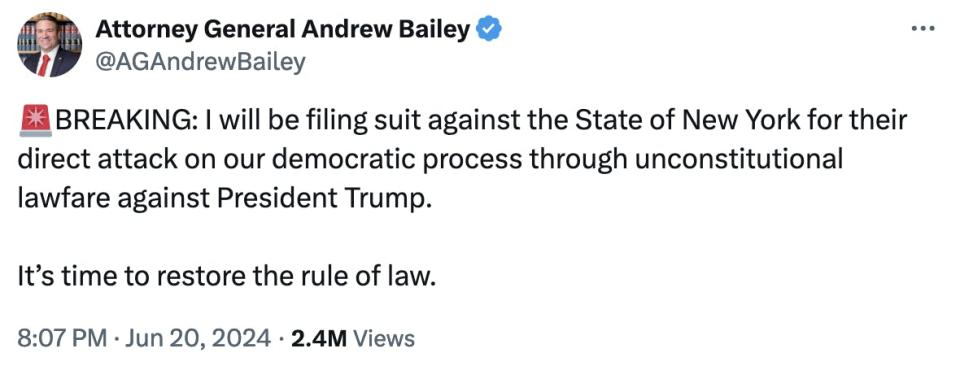Missouri A.G. Wants to Sue New York Over Trump. There’s One Problem.
- Oops!Something went wrong.Please try again later.
- Oops!Something went wrong.Please try again later.
Missouri Attorney General Andrew Bailey announced Thursday night that he plans to sue the state of New York in retaliation for Donald Trump’s criminal conviction. The conservative AG vowed to “restore the rule of law”—but not the ones that found Trump guilty, of course—and deemed Trump’s hush-money trial “unconstitutional lawfare.”

But it doesn’t seem like Bailey understands the law in New York at all, and it doesn’t look like he’s paid much attention to the details of Trump’s hush-money trial. According to Axios, Bailey is pursuing his lawsuit against New York on the basis that the statute of limitations for misdemeanor business records falsification expired in 2019.
There’s just two big hiccups with Bailey’s argument: Trump was indicted on 34 felony counts, not misdemeanors, and the statute of limitations for those felonies is five years after the start of criminal proceedings—not two like with misdemeanors. It’s also unclear where Bailey is getting 2019 as a statute of limitations from: The federal criminal proceedings against Trump kicked off in 2018 after an explosive Wall Street Journal story stated Trump’s former fixer Michael Cohen paid off Stormy Daniels in 2016. The FBI soon raided Cohen, who that same year pleaded guilty to giving hush-money payments to Daniels and another woman, claiming he did so on Trump’s behalf. State criminal proceedings based on Cohen’s testimony formally began in August 2019, four years before Trump was indicted and five years before he was convicted, all of which fall well within New York’s five-year statute of limitations.
Whether Bailey is just bad at math, the law, or keeping up to date on Trump trial chaos ultimately matters little. His lawsuit represents a new wave of attacks that can be best described as, to use Bailey’s wording, “unconstitutional lawfare” being carried out in retaliation for Trump’s conviction. In his rush to preen himself as the ultimate pro-Trump attorney general (during an election year where he’s running against a member of Trump’s legal team), Bailey may soon find himself falling flat on his face: It doesn’t seem Bailey bothered to look into New York’s extremely strong anti-SLAPP laws, which prohibit against retaliatory lawsuits attempting to impede against public participation of matters of public interest. And convicting a former president certainly constitutes a matter of public interest.

